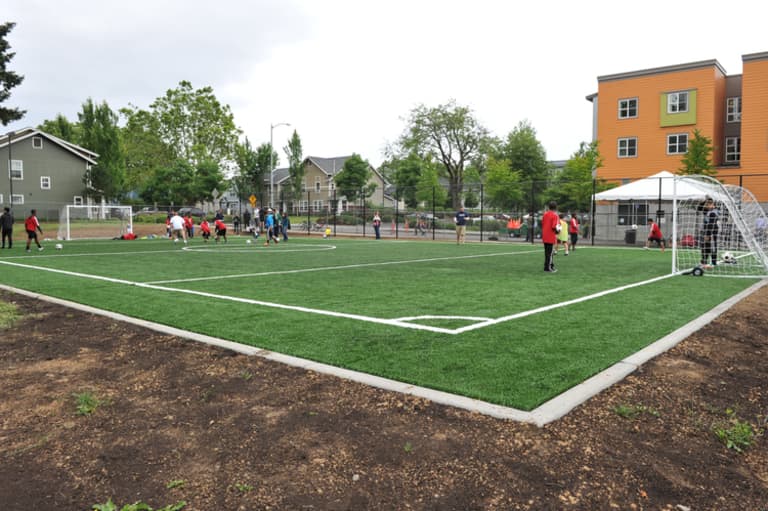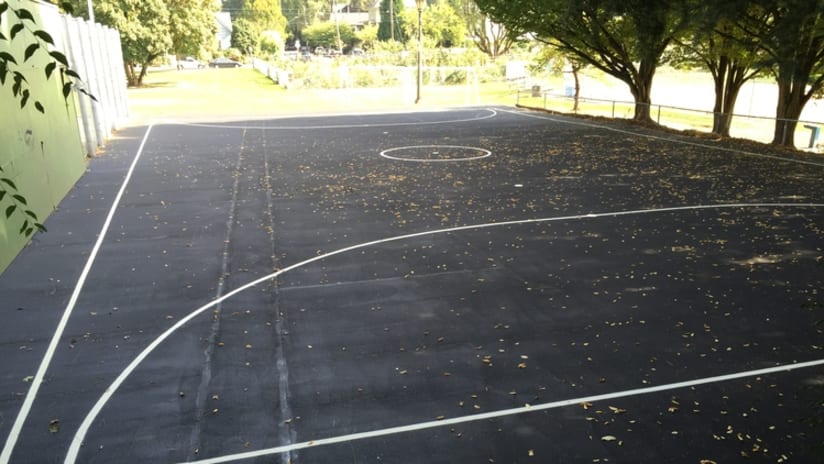As Shawn Levy drove by a Portland park one day last year, it finally hit him. They hadn’t just been for an abstract pipe dream, those hours he had been spending in his free time, squeezed between the demands of a full-time job, a personal life – and more than a decade of supporting the Portland Timbers.
“I drove past the site and there were a group of girls,” he recalls, “maybe anywhere from 15 to 30 years old, some of them clearly had just gotten off the bus from work. They looked like they were like they were not dressed in athletic wear, and were just having a kickaround.”
But they were playing pickup on a futsal court that Levy and his friends had helped build — the latest success story from Operation Pitch Invasion. “I just couldn't believe my eyes,” he recalls. To have created a space where that that pocket of girls felt like, ‘Yes, let's all meet up and play’ — it just felt like a million bucks.”
This Portland-based community-service group sprung from like-minded members of Timbers Army in 2010. As part of their initial mission, they set out to create and fund soccer pitches around Portland, finishing a nearly $200,000 turf field, dubbed Bless Field, in the New Columbia neighborhood.

Operation Pitch Invasion's Bless Field; photo via pitch-invasion.org
Now, Levy, an Operation Pitch Invasion board member, and his colleagues have further refined that into a nimbler passion project they’ve dubbed Project Blacktop. This one, started in 2015, is all about fast work in urban “recreation deserts,” as Levy describes them – members find abandoned blacktop surfaces and rework them into safe futsal courts. Since their first successful conversion, at Col. Summers Park in southeastern Portland, they’ve built three more at Portland-area elementary schools.
And though this grassroots community effort grew, originally, out of a shared love for the Timbers, the end goal comes from basically the goodness of the members’ hearts. It’s not to necessarily do anything to improve their beloved team itself, or anything touching their immediate game-day experience.
“You’re lifting up your town, and you’re lifting up the game,” says Levy. “I personally feel the American Messi is not going to come from … some fancy private school, but he’ll be a kid, or she’ll be a girl from a community where soccer is known and encouraged and it’s a way of life, not just a recreation activity or a means of getting a scholarship.”
Perhaps supporters’ groups are one secret to positive community change, then, on a grassroots, hyper-local level – a way to bring people together over an initial shared interest, and then find other common goals from there.
Once Timbers entered MLS, Levy says, supporters entered a sort of reflective phase. “We had a series of meetings where if we could turn the Timbers Army into a magical elixir, what would we do with that elixir? The first answer we got was to restore and maintain fields in parks and schools,” Levy recalls. “It served a big umbrella under which all people who called themselves Timbers Army [could agree]. You couldn’t say, well, ‘Let’s march for the Equal Rights Amendment,’ because some people would not be into that, but improve soccer culture, everyone was into that.”
If this kind of teamwork within a small group of fans is heartening, well, it isn’t limited to Timbers supporters, of course. Supporters’ groups across the league have long found other common ground to take on philanthropic projects. And the members of Operation Pitch Invasion, too, don’t want to limit their framework to just the Portland area, either.
In fact, they’re hoping to take Project Blacktop to the next level this year, seeking official sponsors for growth in two areas. First, they want to build more futsal courts, of course. But second, they want to help other supporters’ groups across the country launch their own projects, drawing on Project Blacktop’s learnings and framework, and even provide some seed money to do so.
“We have a zero-dollar model where you just volunteer and fix up parks; we have a $5000 model, and a $200,000 model. There's no reason a group of 30 to 50 people minimum can't do one of these things, and truly grow the game, you know, develop local talent,” Levy says. “We know what sort of obstacles you face when you actually do something like this. We want to open-source that to everybody.”
Reach out to share your own supporters’ group or soccer-fan community projects, and let’s amplify the good stuff where we can.













